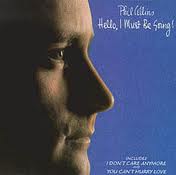 Like all the members of the Progressive Rock giants Genesis, Phil Collins had launched his solo career with a certain amount of music acumen and good will bestowed upon them by the group’s followers. By the time Phil released his second solo offering, Hello, I Must Be Going, he was already becoming one of the leading men in 1980’s pop/rock.
Like all the members of the Progressive Rock giants Genesis, Phil Collins had launched his solo career with a certain amount of music acumen and good will bestowed upon them by the group’s followers. By the time Phil released his second solo offering, Hello, I Must Be Going, he was already becoming one of the leading men in 1980’s pop/rock.
Phil’s debut album, the 1981 release of Face Value, had made sure that Phil’s popularity as the Genesis vocalist, a position he took over when Peter Gabriel left the band after the tour for The Lamb Lies Down on Broadway album, would see him reach number one at the first attempt. For his follow up album, it would be a case of more of the same with demands from the label, the fans and seemingly from the artist himself.
Outside of the Genesis fan base, Phil would become arguably the first one of the classic line up to achieve real notable commercial success as a solo artist. Peter Gabriel had made some excellent contributions to the world of music since he had left the band and Steve Hackett was ploughing his own furrow as the mainstay of the group’s Progressive heritage after he departed before the…And Then There Were Three recording sessions but it was Phil with songs from Face Value that would stir the national conscious first.
Hello, I Must Be Going borrows heavily from the Motown sound that Phil grew up loving, and which he would later return to for his final studio album No Going Back in 2010, and the heavy drum patterns that he would become associated with on all his solo works and on some post Progressive work with Genesis throughout the 1980’s.
There was also something very charming about Hello, I Must Be Going as well. Face Value may sound great but in parts it can be difficult to love. Its heavy dependence on songs that reflected his state of mind around that time can be taxing, like toiling through a boggy field in slippers. You listen to it and appreciate it for the work and commitment that it is, and some of the songs are immensely enjoyable, not just to the fans of Genesis but to the greater record buying public but overall it is getting through Phil’s mud; his anger and the battle within him and his life that makes it feel indelibly voyeuristic.
Hello, I Must Be Going isn’t like that. Yes, there are still elements of being allowed in to Phil’s heart, the rules being broken where he says don’t look here at all but ultimately you sneak a peek and are amazed by what you find hidden away. Instead of mud, what you get is a dry grass field, one that’s been recently mown and cultivated and is an enjoyable meander through. Even though the album still manages to open up with the bitter sounding I Don’t Care Anymore, a timely reminder that he still hasn’t got over past events that he so successfully bought to his fans’ attention in the song In The Air Tonight from the previous offering, he shows great humour and great song writing lyrics to make the album stand out as the best of the first three albums and perhaps his second best of his solo career.
The greatest success of the album was Phil’s reading of the Motown and Supremes hit, You Can’t Hurry Love. This song would be the one that made Phil a star in his right and can be seen as perhaps hastening the decline in output by Genesis over the ensuing years as he continued to make solo hit records. There are few bands from that time that could possibly have made a success of one the great Motown hits whose status was almost legendary, not many bands but certainly one solo musician with an ear for hit record. Its quirky video which saw three Phils on stage mirrored the Supremes and the cheeky nature of Phil’s personality made it a joy to watch. The song would hook a lot of people in, it would give Phil massive exposure and it is no wonder that it made the number 1 position on the U.K. charts and made the top ten on both the U.S. Billboard Hot 100 and Hot Adult Contemporary Tracks listings.
It is a great song and more than matches the original version for its depth of character but it also only one song in plethora that was made into a succession of singles for the Genesis drummer.
The album had its lighter moments as well as the hangovers from his personal life. It was these songs that would go on to be the impetus for the next album, No Jacket Required with its bouncy and sunnier disposition. Songs such as the idiosyncratic and loveable Like China, the creepy and again voyeuristic Thru These Walls and the beautiful ballad of Don’t Let Him Steal Your Heart Away.
The fact that all three remaining members of Genesis were able to put together a string of solo albums each around this time should not detract from the four albums the band were able to come together to record during the rest of the 1980’s. No matter what the commitment was to recording solo albums, Genesis still seemed to put together something special in the remaining time together. Abacab, Genesis, Invisible Touch and the final album with Mike Rutherford, Tony Banks and of course Phil Collins in, the 1991 album We Can’t Dance were as equally well received but it can be seen as early as 1982 that Phil’s future was looking as if it was coming from elsewhere.
If any album was going to tear Phil away and give him a self-belief then there can’t have been a better one at that time than Hello, I Must Be Going.
Ian D. Hall
